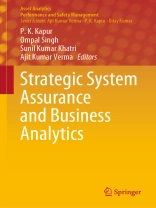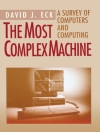This book systematically examines and quantifies industrial problems by assessing the complexity and safety of large systems. It includes chapters on system performance management, software reliability assessment, testing, quality management, analysis using soft computing techniques, management analytics, and business analytics, with a clear focus on exploring real-world business issues. Through contributions from researchers working in the area of performance, management, and business analytics, it explores the development of new methods and approaches to improve business by gaining knowledge from bulk data. With system performance analytics, companies are now able to drive performance and provide actionable insights for each level and for every role using key indicators, generate mobile-enabled scorecards, time series-based analysis using charts, and dashboards.
In the current dynamic environment, a viable tool known as multi-criteria decision analysis (MCDA) is increasingly being adopted to deal with complex business decisions. MCDA is an important decision support tool for analyzing goals and providing optimal solutions and alternatives. It comprises several distinct techniques, which are implemented by specialized decision-making packages. This book addresses a number of important MCDA methods, such as DEMATEL, TOPSIS, AHP, MAUT, and Intuitionistic Fuzzy MCDM, which make it possible to derive maximum utility in the area of analytics. As such, it is a valuable resource for researchers and academicians, as well as practitioners and business experts.विषयसूची
Investing Data with Machine Learning using Python.- Probabilistic Assessment of Complex System with Two Subsystems in Series Arrangement with Multi Types Failure and Two Types of Repair using Copula.- ‘Recognition and Optimizing Process Lagging Indicators during Software Development’.- Risk and Safety Analysis of Warships Operational Lifetime Defects.- Facebook Data Breach: A Systematic Review of its Consequences on Consumers’ Behaviour Towards Advertising.- Fuzzy DEMATEL Approach to Identify the Factors Influencing Efficiency of Indian Retail Websites.- ‘Application of Statistical Techniques in Project Monitoring and Control’.- Sensor Based Smart Agriculture in India.- ‘Integrating UTAUT with Trust and Perceived Benefits to Explain User Adoption of Mobile Payments’.- ‘Improving the Quality of Customer Service of Financial Institutions: the Implementation of Challenger Banks’.- ‘Corporate Image Building in the Indian IT Sector: Conceptualizing through HR Practices’.- Vague Reliability Analysis of Standby Systems with an (N+1) Units.- ‘Experimental study for MRR and TWR on Machining of Inconel 718 using ZNC EDM’.- ‘Blind Quantitative Steganalysis using CNN –Long Short Term Memory Architecture’.- Performance of Autoregressive Tree model in Forecasting Cancer Patients.- Developing a Usage Space Dimension Model to Investigate Influence of Intention to use on Actual Usage of Mobile Phones.- ‘Examining the Relationship Between Customer Oriented Success Factors, Customer Satisfaction, and Repurchase Intention for Mobile Commerce’.- Smart Industrial Packaging and Sorting System.- Credentials Safety and System Security Pay-off and Tradeoff: Comfort Level Security Assurance Framework.- A Study of Microfinance on Sustainable Development.- ‘Development of Decision Support System for a Paper Making Unit of a Paper Plant using Genetic Algorithm Technique’.- ‘The Challenge of Big Data in Official Statistics in India’.- CUDA Accelerated HAPO (C-HAPO) Algorithm for Fast Responses in Vehicular Ad-Hoc Networks.- ‘A Survey of Portfolio Optimization with Emphasis on Investments made by Housewives in Popular Portfolios’.- ‘Single Vacation Policy for Discrete-time Retrial Queue with Two Types of Customers’.- ‘Intuitionistic Fuzzy Hybrid Multi Criteria Decision Making Approach with TOPSIS Method using Entropy Measure for Weighting Criteria’.- Dynamic Analysis of Prey-Predator Model with Harvesting Prey Under the Effect of Pollution and Disease in Prey Species.- ‘Univariate and Multivariate Process Capability Indices – Measures of Process Performance – A Case Study’.- ‘Improving Customer Satisfaction through Reduction in Post Release Defect Density (PRDD)’.- ‘An Architecture for Data Unification in E-commerce using Graph’.- ‘Study on Accident Data Recording Variables in Europe, USA & India’.- Improving The QFD Methodology.- Software Defect Prediction based on Selected Features using Neural Network and Decision Tree.- Testing Effort Dependent Software Reliability Assessment Integrating Change Point, Imperfect Debugging and FRF.- ‘Assessing the Severity of Software Bug using Neural Network’.- Optimal Refill Policy for New Product and Optimal Take Back Quantity of Used Product with Deteriorating Items Under Inflation and Lead Time.- Blockchain Based Social Network Infrastructure.- ‘Performance Analysis of an Active-Standby Embedded Cluster System with Software Rejuvenation, Fault Coverage and Reboot’.- ‘Analysis of Jeffcott Rotor and Rotor with Disk Using Xlrotor’.- Foodie: An Automated Food Ordering System.- Prioritization of Different types of Software Vulnerabilities using Structural Equation Modelling.- Fog-Based Internet of Things Security Issues.- Estimation of Fatigue life of PLCC Solder Joints Under Vibration Loading.
लेखक के बारे में
P.K. Kapur is Director of Amity Centre for Interdisciplinary Research, Amity University, Noida, and former Dean of the Faculty of Mathematical Sciences, University of Delhi, India. He has been the President of the SREQOM (Regd.) since 2000 and is former President of ORSI. He is the Editor-in-Chief of the International Journal of System Assurance Engineering and Management, Springer (India). He has published over 350 papers in respected international journals and proceedings and has co-authored two books on software reliability with OR applications.
Ompal Singh is an Associate Professor at the Department of Operational Research, University of Delhi, India. He obtained his Ph.D. in Software Reliability from the University of Delhi in 2004, and has more than 15 years of experience in teaching, research, and consultation in the area of data handling, data analysis, and modeling in the various fields of operational research. He has published more than 100 researchpapers in respected international journals and proceedings.
Sunil Kumar Khatri is Director, Amity University, Tashkent Campus, Tashkent, Uzbekistan and is a Fellow of Institution of Electronics and Telecommunication Engineers (IETE). He has edited seven books and seven special issues of international journals, as well as more than 100 papers in respected international and national journals and proceedings. He holds various patents, and has been involved in a number of international training projects to his credit. He is an Editor of International Journal of Systems Assurance Engineering and Management, Springer, and is on the editorial boards of several journals in the USA, Egypt, Hong Kong, Singapore and India.
Ajit K. Verma is a Professor (Technical Safety) of Engineering, Western Norway University of Applied Sciences, Haugesund, Norway. He was previously a Senior Professor at the Department of Electrical Engineering at IIT Bombay, India. He has published over 250 papers in various journals and conferences. He is a senior member of the IEEE and a life Fellow of the IETE and Editor-in-Chief of IJSAEM and the Journal of Life Cycle Reliability and Safety Engineering.












